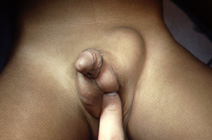Indirect Inguinal Hernia
|
Inguinal hernias in children almost always result from a
persistence of the patent processus vaginalis. Like
hydroceles, peritoneal fluid can move into the scrotum, but
unlike hydroceles, the processus vaginalis is large enough
to allow bowel to herniate into the inguinal canal. The term
'indirect' refers to the fact that the bowel and peritoneal
protrusion don't herniate directly through a weakness in the
abdominal musculature. Rather, the bowel and peritoneal
fluid move through a patent processus vaginalis into the
scrotum. Direct inguinal hernias occur because of weakness
in the floor of the inguinal canal.
|

|
Incidence: 3% in full term infants. Hernias are more common in
premature males. The infant may have been born before the normal
gestational age at which the patent processus closes (32-38 weeks).
Diagnosis: palpable mass along the inguinal canal. Placing a
finger tip on the scrotum and extending the finger into the inguinal
canal will demonstrate a patent tunnel and one may feel bowel within
the canal.
Treatment: Inguinal hernias do not spontaneously resolve so
surgery is required. If bowel becomes entrapped within the inguinal
canal an incarcerated hernia can occur. This is a surgical emergency
because the entrapped bowel can become ischemic.
Return to Abnormal Testis Development
Return to Normal Testis Development
Return to G/U Development home page.
©David A. Hatch, M.D., 1996
